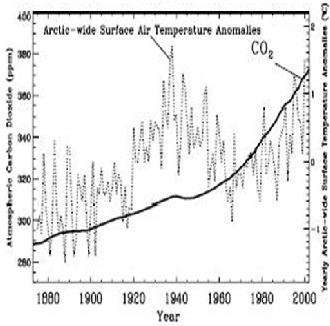
International Journal of Scientific & Engineering Research Volume 4, Issue 2, February-2013 1
ISSN 2229-5518
Role of Man in Global Warming
Aman Maqbool
Abstract— The purpose of this technical paper is to highlight the role that man plays in causing Global warming. It is very essential to realise that global warming is mainly caused because of natural factors which are more or less inevitable. Global Warming which today without a doubt is a topic of pandemic concern is also a topic which people have very less "actual" idea about. Various scientists and esteemed professors have been misguiding people over the years and have been causing an international swindle. This paper is an attempted eye-opener. The paper will be highlighting some of the major flaws in the theory of global warming (caused by human activities); common beliefs and myths will be cleared not by objectionable opinions but on the basis of scientific research.
Index Terms— CO2, Environment, Global Temperatures, Global Warming, Melting of Glaciers, Misconceptions, Solar Activity
—————————— ——————————
lobal warming is undeniably not only considered to be an interesting topic but also one of the first things that may come to the mind of a person concerned with the
natural environment.
The meaning, definition, effects, causes etc. of global warm- ing have been addressed innumerable times. However, most of the times humans are blamed for it without giving any thought to the extent to which humans are responsible.
Over the years various loop holes have been discovered in the theory of artificial (human caused) global warming and thanks to the brave efforts of scientists, certain astounding facts and undeniable evidences are beginning to bubble up.
It is certain that increased greenhouse gas emissions from the burning of fossil fuels and from change in land use lead to a warming of climate, and it is very likely that these Greenhouse gases are the dominant cause of the global warming that has been taking place rapidly over the past few decades.
Different greenhouse gases have very different specific heat capacity. Whilst the extent of climate change is often ex- pressed in a single figure – global temperature – the effects of climate change (such as temperature, precipitation and the frequency of extreme weather events) will vary greatly from place to place.
Climate change (here) generally refers to a long-term change
————————————————
Aman Maqbool is currently pursuing bachelors degree program in chemical engineering from BVCOE, University of Mumbai, India.
E-mail: amaan_maqbool@hotmail.com
(usually an increase) in global temperatures.
Scientists learnt that there are several greenhouse gases re- sponsible for warming, and humans emit them in a variety of ways. Most come from the combustion of fossil fuels in cars, factories and electricity production. The gas responsible for
the most warming is carbon dioxide, also called CO₂. Other
contributors include methane released from landfills and agri-
culture (especially from the digestive systems of grazing ani-
mals), nitrous oxide from fertilizers, gases used for refrigera-
tion and industrial processes, and the loss of forests that
would otherwise store CO₂.
1) Myth: Emission of Greenhouse gases is generally consid- ered to be the chief reason for Global Warming. It is believed that Greenhouse gases like CO2, CH4 etc. which are present in the atmosphere trap the reflected heat from the Earth’s sur- face. This trapped heat hence results in the increase in temper- ature. The same phenomenon at the Global level is called Global Warming.
2) Fact: The myth sounds very convincing and makes sense however it is something that various scientific efforts do not comply with. Global warming has no direct link with the in- crease in CO2 emissions as shown by Fig: 1. Greenhouse gases like CO2 are held responsible; however, we fail to realize that water vapour is the largest Greenhouse gas (in terms of quan- tity).
The major cause of Global warming as per scientific re- search is Solar Activity as shown in Fig: 2. The Sun and basi- cally every star has periods of alternating high and low solar activity. As Sun is the source of heat energy for the Earth, it is obvious that an increase in solar activity would give rise to increase in temperatures.
IJSER © 2013 http://www.ijser.org
International Journal of Scientific & Engineering Research Volume 4, Issue 2, February-2013 2
ISSN 2229-5518

Fig. 1. Arctic Basin wide air temperatures (Polyokov) with annual average CO2 (Soon 2005) showing no direct link between CO2 and Global Temper- ature.
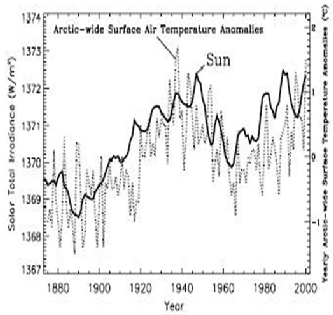
Fig. 2. Hoyt Schatten Total Solar Irradiance (TSI) with annual average CO2 (Soon 2005) showing resemblance of Global Temperature with fluctuating Solar Activity.
One must also remember that a period of high activity is followed by a period of low activity which is clearly evident from Fig: 3. It is due to this reason that the Global tempera- tures were high, followed by the Ice Age and once again a gradual increase in temperatures, a fact which has been prov- en through Ice Excavations conducted in the Arctic region.
Industrialization is considered to be the major reason for the
emission of Greenhouse Gases. It is a known fact that indus- trialization rapidly increased during the Second World War. It is understood by logic that the temperatures should have in- creased in this period; however, statistics prove that the Glob- al temperatures actually fell instead of increasing (seen in Fig:
4)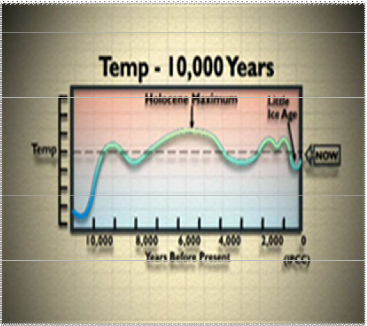
Fig. 3. Graph shows the variation of temperature occurring in the past
10,000 years indicating current temperature to be below average.
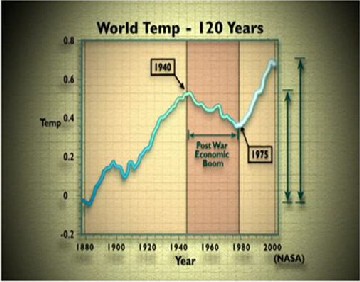
Fig. 4. Graph shows the fall in Global Temperature during the peak of industrialisation (pollution).
These evidences prove that Global Warming primarily oc- curs because of a gradual change in Solar Activity (which is completely natural) and the emission of CO2 or any other
IJSER © 2013 http://www.ijser.org
International Journal of Scientific & Engineering Research Volume 4, Issue 2, February-2013 3
ISSN 2229-5518
greenhouse gas has a small effect on global temperature.
1) Myth: Almost always the entire blame for Global warming is put on the emission of Greenhouse gases. Greenhouse gases trap heat and hence lead to increase in temperatures. The idea is that an increase in carbon dioxide in Earth’s atmosphere is what leads to an increase in Earth’s temperature.
2) Fact: Professor Zbigniew Jaworowski, Chairman of the Sci- entific Council of the Central Laboratory for Radiological Pro- tection in Warsaw, Poland published his research that found that a change in Earth’s temperature would have more to do with cloud cover and water vapour than carbon dioxide con- centration in the atmosphere [1]. He points out that “cloudi- ness and water vapour are nearly a hundred times more influ- ential on global temperature variations than all the rest of the greenhouse gases combined.” He suggests for example, that “if it were possible to double the global CO2 concentration, the effect could be equivalent to just 1% increase in cloudi- ness”.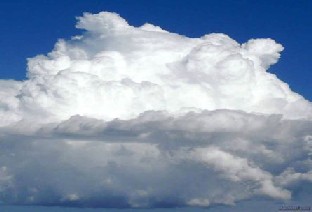
Fig. 5. Dense clouds (water vapour) act as heat absorbers.
1) Myth: Many scientists believe how global warming will not have the worst impact on animals that live in Polar Regions but on the ones that live in tropics. Many tropical animal spe- cies are at great jeopardy of going extinct even with the tem- perature rise of just a degree or two simply because these spe- cies are familiar to live in an environment within a very small temperature range, and any temperature increase above this range is likely to cause their extinction as they will not have enough time to adapt.
2) Fact: Countless discoveries over the past year reminded us that, despite centuries of research, the planet still has plenty of surprise species in store. Taxonomic classification of species follows a particular pattern, assessment of which helps us to predict the total number of species as ~8.7 million (±1.3 mil-
lion SE) species globally, of which ~2.2 million (±0.18 million SE) are marine. Results suggest that some 86% of the species on Earth, and 91% in the ocean, still await description [2].
Fig 6 proves that the number of species is rapidly increas- ing [3] contradicting the general perception that they are de- creasing. Although variation in temperature leads to extinc- tion of various different species, theory of natural selection must not be forgotten. Extinct species are replaced by organ- isms that are more adaptable to the changing environment.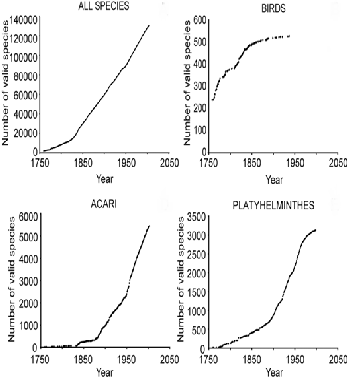
Fig. 6. Graph shows an increase in the number of species in all cases.
The outer surface of the Earth is divided into tectonic plates, which formed in the early days of Earth's creation. These plates move, allowing molten rock known as magma to rise up and fill in the gaps between the plates. Tectonic plates con- tinuously move. While no ice exists deep down where this activity occurs, the melting of ice on the planet's surface can affect the plates beneath. These glaciers are made to move be- cause of their own weight and the extent of movement is fur- ther intensified due to the movement of the Tectonic Plates beneath the glaciers.
1) Myth: It is said that Global Warming leads to the melting of glaciers present in the polar caps. Various statements have been made about the melting of Arctic glaciers along with evi- dence backing it up.
2) Fact: However, what one fails to realise is that if “Global”
warming means temperature increment globally then how can
IJSER © 2013 http://www.ijser.org
International Journal of Scientific & Engineering Research Volume 4, Issue 2, February-2013 4
ISSN 2229-5518
we explain the fact that the Glaciers in the Antarctic region i.e. South Pole are rapidly expanding.
In an interview with The Mail, Dr. Murari Lal the scientist behind the bogus claim in a Nobel Prize-winning UN report that Himalayan glaciers will have melted by 2035 admitted it was included purely to put political pressure on world leaders [4].
The July 2012 Southern Hemisphere sea ice extent was 16.7 million square km (6.4 million square miles), 2.21 per cent above average and the 9th largest (26th smallest) July sea ice extent in the 1979-2012 period of record. Antarctic sea ice ex- tent during July has increased at an average rate of 0.9 per cent per decade, with substantial inter-annual variability [5]. According to NASA researchers, for several days during early July, nearly the entire Greenland ice sheet experienced a brief period of surface melting. The melting was associated with a strong high pressure system bringing warmer-than-average conditions to Greenland. However, ice core data indicates that such an event occurs about once every 150 years.
This suggests that the melting of Arctic ice is caused largely because of natural phenomena rather than human activities.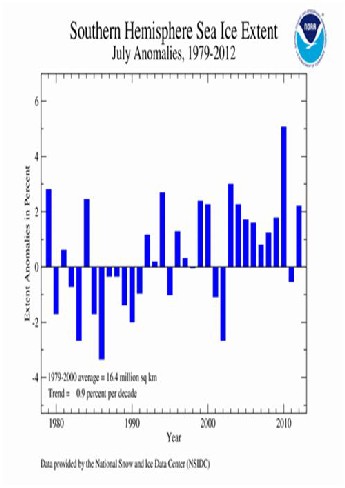
Fig. 8. Increase of more than 2% in the ice extent of Antarctic
Region
There are various reasons behind the developing and the spreading of incorrect concept of Global Warming.
Federal funding for climate change increased from $2.4 billion in 1993 to $5.1 billion in 2004 (116 per cent), as reported by OMB (Office of Management and Budget), or from $3.3 billion to $5.1 billion (55 per cent) after adjusting for inflation.[6] Dur- ing the past thirteen years the United States, through the U.S. Global Change Research Program (USGCRP), has made the world's largest scientific investment in the areas of climate change and global change research -- a total investment of al- most $20 billion.[7]
Research funding largely depends on the topic of the re- search. The more interesting the topic, the lesser the work does a scientist need to do in rationalizing as to why the research needs to be funded.
Global warming has always been an interesting topic, as even a common man who does not understand the technicali- ties of the topic can feel himself/herself to be a part of the en- vironment and hence a part of the effects of Global warming. Media persons have largely capitalized by the idea of inscrib- ing fear in the minds of people mainly belonging to uneducat- ed sector of society who have insufficient knowledge of the concept. There has hence been increased funding for the pur- pose of research on global warming as it provides even more economic returns.
In recent years, analysts and U.S. policymakers have noted Africa’s growing strategic importance to U.S. interests [8]. Among those interests is the increasing importance of Africa’s natural resources, particularly energy resources.
There has always been instability and social unrest in Afri- ca because of various issues like civil wars, criminal activities, terrorism, piracy etc. Instability heightens human suffering and retards economic development, which may in turn threat- en U.S. economic interests.
Africa’s exports of crude oil to the United States are now roughly equal to those of the Middle East, further emphasiz- ing the continent’s strategic importance. “The US is trying to kill the African dream and the African dream is to develop” commented James Shikwati, economist and author.
On February 6, 2007, the Bush Administration announced the creation of a new unified combatant command, U.S. Africa Command or AFRICOM, to promote U.S. national security objectives in Africa and its surrounding waters. It is claimed by Shikwati that US is intentionally disallowing the fossil fuel rich African states to use their resources (in the name of envi- ronmental pollution) and solve their energy crises. This would result in their dependence on the US, who would then get a chance to extract the African resources
Margaret Thatcher is a British politician, the longest-serving (1979–1990) Prime Minister of the United Kingdom of the 20th century, and the only woman ever to have held the post.
IJSER © 2013 http://www.ijser.org
International Journal of Scientific & Engineering Research Volume 4, Issue 2, February-2013 5
ISSN 2229-5518
A Soviet journalist nicknamed her the "Iron Lady", which became associated with her uncompromising politics and leadership style. As Prime Minister, she implemented Con- servative policies that have come to be known as Thatcherism.
Two things happened to change the main-stream view about climate change. Firstly, the decline in the global temper- ature came to a halt in 1975 and the temperature began to rise. Secondly, politicians became concerned about the security of the supply of fossil fuels. In the United Kingdom in 1984, the coal miners went on strike. The Conservative Party, led by Margaret Thatcher, had reason to be concerned about this be- cause strikes by the miners in 1972 and 1974 had led to the downfall of the Conservative government of the time. Con- cerns also persisted about the security of the supply of oil, because of the 1973 oil embargo by the Arab oil-producing countries. The government wanted to promote the use of nu- clear power, though this was being hampered by the fear of nuclear accidents and radioactive pollution. The government was thus keen to highlight possible problems with the use of fossil fuels. They were aware of Bolin's climate change theory and offered research funding to gain support for the theory. The Meteorological Office set up a climate modelling unit, which provided the basis for an international committee called the Intergovernmental Panel on Climate Change (IPCC). The IPCC went on to produce a report in which they claimed that man-made production of carbon dioxide was causing the global temperature to rise.
The report put forth by IPCC however, is inaccurate as pre- viously proved by Fig. 1.
It is an accepted fact the Global temperatures are rising. Vari- ous newspaper headlines and news reports frequently remind people of the threatening effects of rise in temperatures and the melting of glaciers, rising sea levels etc. which is associated with it.
While it is true that the Global temperatures are expected to rise due to an increase in Solar Activity, the extent to which the temperatures would rise is nothing but over exaggerated. This is because of certain errors in estimating temperatures as two essential factors are neglected.
1) Neglecting Absorption Phenomenon: Professor Patrick Michaels, a senior fellow in environmental studies at the Cato Institute had earlier discovered the flaws in the report put forth by U.S. National Assessment on global warming. [9] Condemning the climate models, he said “All implied effects, including the large temperature rise, are therefore based upon a multiple scientific failure.”
Basically, most temperature estimations are largely based on recording the emissions of Greenhouse gases; however the absorption of the same is neglected.
Oceans cover about 71% of the Earth’s surface. Oceanic wa- ter has the property of absorbing heat energy. Neglecting this fact leads to wrong estimations. Plants also have the ability to absorb carbon dioxide. Forest cover hence largely decreases the effect of Greenhouse gases.
2) Neglecting Thermodynamic Factors: Thermodynamically, the Earth is an open system. It means that Earth allows the exchange of energy with its surrounding. It has been scientifi- cally observed that as the altitude increases the temperature decreases. [10] Keeping both of these facts in mind, we can come to the conclusion that heat energy from a region of high- er temperatures should move to a region of low temperatures. Most temperature estimations are done by strongly emphasiz- ing on emissions while neglecting thermodynamic factors and loss of heat to the outer space. It is due to this reason that most temperature estimations predict the temperatures to rise way more than the actual values.
Although the fact cannot be denied that global tempera- tures are rising, but the extent to which they would rise is over exaggerated in various news reports. Fig 9 suggests that in the past 50 years, which is believed to be a period with maximum increase in global temperatures, displayed a rise of a mere
0.6°C.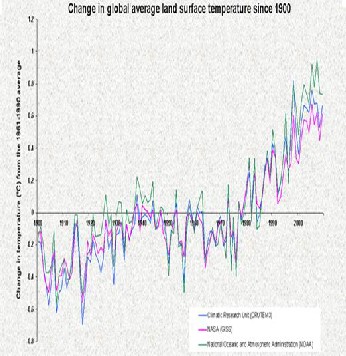
Fig. 9. Temperature variation over 110 years.
The phenomenon of heating of the Earth and conse- quent rise in Global temperatures is called as Global Warming.
The chief cause for Global warming is solar activity which leads to gradual increase as well as decrease in Global temperatures alternatively over large intervals of time.
Global Warming is not caused because of the Green- house effect, although greenhouse gases have a local- ized effect on temperatures.
IJSER © 2013 http://www.ijser.org
International Journal of Scientific & Engineering Research Volume 4, Issue 2, February-2013 6
ISSN 2229-5518
Global warming is not the main reason behind melt- ing of glaciers. Glaciers melt mainly because of polar drift of tectonic plates.
Although this paper suggests that Global Warming is caused mainly because of natural phenomena, it does not mean that man is absolutely innocent hence it is requested that the paper is not misinterpreted.
The concept in no way discourages any eco-friendly acts. It in fact encourages an increased research on the topic. It en- courages the development of green technology so as to reduce the emission of greenhouse gases because even though they have a very mild effect on international temperatures, they do have a localized effect.
The paper highlights the need for a detailed thermody- namic consideration of the planet Earth and its atmosphere.
The paper conclusively proves that although climate change is an actual issue human activities have a minor role to play in it. Global warming or climate change is a natural phenomenon and hence solar activity can only be held as the responsible agent but can’t be blamed for it, as the fluctuation in solar ac- tivity is part of its life cycle.
It is expected that the concept of global warming has be- come more clear through the revised theory now that the myths and errors in the former theory have been discussed.
It is fair enough to conclude that global warming remains one of the many over-hyped topics which actually requires more emphasis towards the solution rather than the preven- tion. The media and scientists should not try to sell their ficti- tious (although interesting) stories which may result in unnec- essary panic among people and also to an unjust research funds distribution.
I sincerely thank Dr. Bhawna Singh, Dr. R.J. Gawade and Head of Chemical Department, Prof. S.P.Shingare of BVCOE, University of Mumbai for their guidance and motivation in bringing out this paper.
[1] Ancient atmosphere- Validity of ice records, Zbigniew Jaworowski, Envi- ronmental Science and Pollution Research, September 1994, Volume 1, Issue
3, pp 161-17.
[2] Mora C, Tittensor DP, Adl S, Simpson AGB, Worm B (2011) How Many Species Are There on Earth and in the Ocean? PLoS Biol 9(8): e1001127. doi:10.1371/journal.pbio.1001127
[3] http://www.plosone.org/article/info:doi/10.1371/journal.pone.0036881?im ageURI=info:doi/10.1371/journal.pone.0036881.g001..
[4] Glacier scientist: I knew data hadn't been verified, By DAVID ROSE, Mon
24th January 2010, The Mail.
[5] NOAA National Climatic Data Center, State of the Climate: Global Snow & Ice for July 2012, published online August 2012, retrieved on August 30, 2012 from http://www.ncdc.noaa.gov/sotc/global-snow/2012/7
[6] GAO-05-461 'Climate Change: Federal Reports on Climate Change Funding
Should Be Clearer and More Complete'
[7] http://www.climatescience.gov/about/default.htm
[8] Africa Command: U.S. Strategic Interests and the Role of the U.S. Military in
Africa, Lauren Ploch, July 22, 2011, Congressional Research Service.
[9] http://www.cato.org/publications/commentary/flips-flops-facts-about- global-warming by Patrick J. Michaels.
[10] Altitude dependence of atmospheric temperature trends: Climate models versus observation. arXiv:physics/0407074 [physics.geo-ph].
IJSER © 2013 http://www.ijser.org